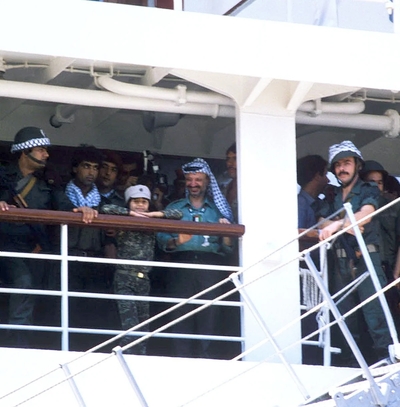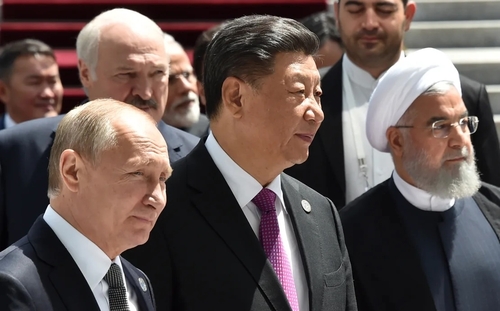Atlantico Quotidiano: Israel's Prime Minister Benjamin Netanyahu talks repeatedly of "total victory" against Hamas. As author of the Israel Victory doctrine, please interpret this.
Daniel Pipes: As of today, 5 April, the 182nd day of the Hamas-Israel conflict, I count Netanyahu mentioning victory in 53 statements, and in some of those statements, he refers to it 11, 14, 15, and even 16 times, for an aggregate of 158 times. And this is just what turns up in English. He often adds an adjective to strengthen the word victory: complete, clear, absolute, decisive, full, and resounding, but total is the preferred term, appearing 73 times. This is an extraordinary record; I wonder if it has any parallel.
I interpret this rhetorical emphasis in several ways: (1) a signal to Israelis that he learned the lesson of Oct. 7 and will be much tougher in the future, that he deserves to continue as their prime minister; (2) an assertion to the U.S. and other friendly governments that they should not bother to pressure him to reduce hostilities in Gaza; and (3) a warning to Hamas that it will be destroyed.
What will total victory mean on the ground? Given the domestic pressure for the return of Israeli hostages in Hamas' control and the international pressure to desist from attacking Hamas, I expect some kind of deal will be worked out, perhaps along the lines of the PLO's two departures from Lebanon in August 1982 and December 1983, when Yasir Arafat and his henchmen sailed away to Tunisia. This hardly represents total victory but it will have to suffice.
 A model for 2024? Yasir Arafat departed Beirut by ship in 1982. |
AQ: Is the "two-state solution" permanent U.S. policy?
DP: Yes. Coincidentally, I published an article yesterday, "My Six-Step Plan for a Two-State Solution," in which I argue that (1) the U.S. and Israeli governments have both accepted a Palestinian state, so this debate is over; (2) both imposed extensive conditions before recognizing such a state, not a single one of which the Palestinian Authority has fulfilled; and (3) the two governments should stop arguing and join forces to pressure the Palestinian Authority to fulfill those conditions.
AQ: How should the West respond to Tehran's many aggressions, including Oct. 7, Hezbollah attacks on Israel, Houthi attacks on Red Sea maritime trade, and proxy attacks on U.S. forces?
DP: With severity, including warnings, the use of force on a tactical level, support for regime dissidents, and ultimately the destruction of Iran's nuclear infrastructure. The mullahs nearly have The Bomb; what are we waiting for?
AQ: Do you favor the U.S. disengagement from its global role since 2009 or do you wish for a return to a more active role?
DP: I long for the old days. The United States even at its weakest, for example, under Jimmy Carter, had a firmer and more predictable role in the world. The Woke Left and the MAGA Right dismay me about equally, the former supporting Hamas and the latter not opposing Putin.
AQ: Imagine that, even as Russia invades Ukraine, Iran closes the Persian Gulf and China imposes an embargo on Taiwan; what Western response to you expect?
 The Russian (L), Chinese, and Iranian presidents at a Shanghai Cooperation Organisation meeting in 2019. |
DP: Russia's invasion is a humanitarian disaster but a strategic gain: NATO has expanded and rediscovered its purposes, arsenals are growing, Western populations better understand that vital interests need to be militarily defended. That said, the inadequate support for Ukraine, the unwillingness to remove the Houthi menace from the Red Sea, and the supine policy toward Tehran do not fill me with confidence. The fact that all three of Russia, Iran, and China see limited windows of opportunity ahead makes the situation the more frightening.
AQ: Your father, Richard Pipes, was one of the most lucid analysts and scholars of Russia and the Soviet Union. Can you speculate about his response to Putin's invasion of Ukraine?
DP: A historian, my father emphasized continuities between different eras in Russia, especially the tsarist and the Soviet ones. While he was hopeful that post-Soviet Russia had a chance to break with its troubled legacy, he was hardly surprised that Vladimir Putin reverted to form – anti-democratic, repressive, and expansionist. He also predicted that Russia will never allow Ukraine "to get connected institutionally with the West." So, Feb. 24 would not have surprised him and he would have passionately supported Kyiv in the war.
AQ: Based on his work, how seriously should we take Putin's nuclear threats?
DP: Very seriously. Putin is a Soviet man; he lived his first 39 years in the Soviet Union, rose to the rank of lieutenant colonel in the KGB foreign intelligence, and publicly rued the U.S.S.R.'s demise. He was shaped by and continues to reflect Soviet doctrines.
One of those doctrines concerns the use of nuclear weapons. In 1977, my father revealed this doctrine in a Commentary magazine article, "Why the Soviet Union Thinks It Could Fight & Win a Nuclear War." He wrote:
The strategic doctrine adopted by the USSR over the past two decades calls for a policy diametrically opposite to that adopted in the United States. ... The notion of an extended nuclear war is deeply embedded in Soviet thinking, despite its being dismissed by Western strategists who think of war as a one-two exchange. ... Whereas we view nuclear weapons as a deterrent, the Russians see them as a "compellant."
He concluded, "There is something innately destabilizing in the very fact that we consider nuclear war unfeasible and suicidal for both, and our chief adversary views it as feasible and winnable for himself." Nearly a half-century later, that article deserves a careful reading by Western policymakers.
